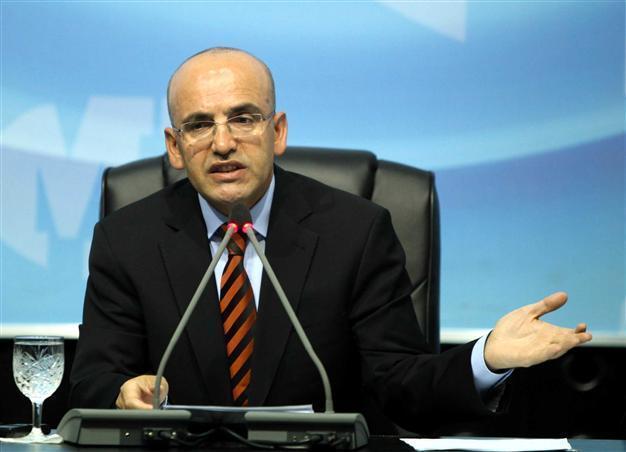Turkey set to miss budget target, plans tighter policy
ANKARA - Reuters

Turkish Finance Minister Mehmet Şimşek. AA Photo
Turkey is very likely to miss its budget deficit target of 1.5 percent of national output this year as growth slows and tax revenues fall and the government is looking at corrective measures including spending controls, Finance Minister Mehmet Şimşek has told Reuters.Turkey has seen a near tripling of per capita income over the past decade and the government has rarely missed its budget deficit targets, earning it a reputation for fiscal discipline which has distinguished it from peers.
But weakening domestic demand and disappointing privatisation receipts combined with higher public sector wage costs and heavy infrastructure spending mean budgetary balances are deteriorating.
Economic growth in the second quarter would probably be stronger than in the first but preliminary data suggested it would be softer in the third, Simsek said in an interview in his office late on Wednesday.
"It looks very unlikely that we will attain our fiscal targets," Şimşek said.
Turkey is due to release second quarter figures for gross domestic product on Monday. Growth in the first quarter was 3.2 percent year-on-year and Şimşek said the country was likely to miss its 4 percent growth target for 2012 as a whole.
"We are working on the corrective measures, but I can't comment on the timing. We are looking across the board, from spending controls to other measures," Şimşek said, declining to give any details because government negotiations on the 2013 budget had only just begun.
"The chances are (4 percent growth this year) is going to be very unlikely. How much lower than that, I think you would have to see second quarter numbers," he said.
A Reuters poll of 14 analysts put second quarter economic growth at 3.25 percent, chiming with Şimşek's expectation.
Weaker domestic demand
Şimşek said that growth this year had been driven by exports rather than domestic demand, having a negative impact on revenues because Turkey gives tax rebates to exporters as part of a policy to boost production.
"It's not (just) that the headline GDP growth is softer, it is also that the composition of growth is very unfavourable when it comes to tax revenues," he said.
Analysts expect the government to raise taxes in the fourth quarter including those on cigarettes and alcoholic drinks.
The government has to submit the 2013 budget to parliament by October 17 and is also working on its medium-term programme, meaning details of the "corrective measures" were still being negotiated.
Şimşek said Turkey would comfortably meet a gross debt to GDP target of 37 percent by the end of the year and that he saw a higher chance of being within a current account deficit target of $65 billion, equivalent to 8 percent of GDP, than of overshooting it.
He said higher global oil prices were the "single biggest threat" to Turkey's economic outlook and noted that although weak European demand was a drag, Turkish exporters had diversified, with Europe accounting for just 34 percent of exports compared with almost 60 percent a few years ago.
The central bank has been battling to bring inflation and Turkey's large shortfall on the current account down without provoking a "hard landing" that would prod the economy into recession.
Şimşek said a strong harvest at home would help to offset rising global food prices in that context.
Privatisation plans
High valuations and tough funding conditions due to the euro zone crisis have forced the postponement of several Turkish privatisation tenders over the past few years and Şimşek hinted the government's strategy would change.
"Typically we have focused on privatisation of relatively complicated sectors or assets, privatisations that matter more in terms of reforms rather than in terms of revenues," Şimşek said, citing electricity distribution networks as an example.
"In 2013, we will again prioritise those areas which emphasise the aspect of structural reform but we will also consider the revenue side," he said, giving plans to privatise the national lottery as an example and saying secondary public offerings of some state assets were also a possibility.
The crisis in neighbouring Syria has had an effect on bilateral trade and the government, including local authorities and agencies, has spent nearly 500 million lira ($275 million) sheltering refugees fleeing the fighting, Simsek said.
Turkey is sheltering around 80,000 Syrian refugees and has repeatedly complained that the international community is doing to little to help cope with a growing humanitarian crisis. ($1 = 1.8215 Turkish liras)
















